9 books about Murder in literature
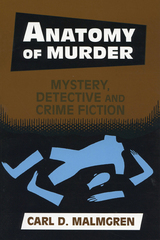
Anatomy of Murder
Mystery, Detective, and Crime Fiction
Carl D. Malmgren
University of Wisconsin Press, 2001
Anatomy of Murder identifies and explores three basic fictional forms dealing with murder and detection—mystery, detective, and crime fiction. Mystery fiction takes place in a centered world, one whose most distinctive characteristic is motivation. Covering the forms of murder fiction, the book examines texts by Doyle, Christie, Sayers, Hammett, Chandler, Highsmith, Jim Thompson, Thomas Harris, and others.
[more]
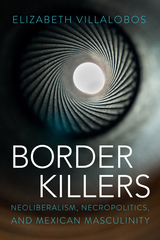
Border Killers
Neoliberalism, Necropolitics, and Mexican Masculinity
Elizabeth Villalobos
University of Arizona Press, 2024
Border Killers delves into how recent Mexican creators have reported, analyzed, distended, and refracted the increasingly violent world of neoliberal Mexico, especially its versions of masculinity. By looking to the insights of artists, writers, and filmmakers, Elizabeth Villalobos offers a path for making sense and critiquing very real border violence in contemporary Mexico.
Villalobos focuses on representations of “border killers” in literature, film, and theater. The author develops a metaphor of “maquilization” to describe the mass-production of masculine violence as a result of neoliberalism. The author demonstrates that the killer is an interchangeable cog in a societal factory of violence whose work is to produce dead bodies. By turning to cultural narratives, Villalobos seeks to counter the sensationalistic and stereotyped media depictions of border residents as criminals. The cultural works she examines instead indict the Mexican state and the global economic system for producing agents of violence.
Focusing on both Mexico’s northern and southern borders, Border Killers uses Achille Mbembe’s concept of necropolitics and various theories of masculinity to argue that contemporary Mexico is home to a form of necropolitical masculinity that has flourished in the neoliberal era and made the exercise of death both profitable and necessary for the functioning of Mexico’s state-cartel-corporate governance matrix.
Villalobos focuses on representations of “border killers” in literature, film, and theater. The author develops a metaphor of “maquilization” to describe the mass-production of masculine violence as a result of neoliberalism. The author demonstrates that the killer is an interchangeable cog in a societal factory of violence whose work is to produce dead bodies. By turning to cultural narratives, Villalobos seeks to counter the sensationalistic and stereotyped media depictions of border residents as criminals. The cultural works she examines instead indict the Mexican state and the global economic system for producing agents of violence.
Focusing on both Mexico’s northern and southern borders, Border Killers uses Achille Mbembe’s concept of necropolitics and various theories of masculinity to argue that contemporary Mexico is home to a form of necropolitical masculinity that has flourished in the neoliberal era and made the exercise of death both profitable and necessary for the functioning of Mexico’s state-cartel-corporate governance matrix.
[more]
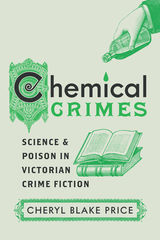
Chemical Crimes
Science and Poison in Victorian Crime Fiction
Cheryl B. Price
The Ohio State University Press, 2019
In Chemical Crimes: Science and Poison in Victorian Crime Fiction, Cheryl Blake Price delves into the dark world of Victorian criminality to examine how poison allowed authors to disrupt gender boundaries, genre, and the professionalization of science. Tracing the role of the chemical crime through the works of Letitia Elizabeth Landon, Ellen Wood, Edward Bulwer Lytton, L. T. Meade, Charles Warren Adams, and Wilkie Collins, Price argues that poison this intervention not only provided a useful tool for authors to challenge the growing power of science but also that its fluid nature and ability to mix, mingle, and transcend boundaries made it ideal for generic experimentation.
From the Newgate and Silver Fork novels of the 1830s to the emergent genres of science and detective fiction of the 1890s, Price advocates for the classification of a new type of poisoner, one who combined crime with methodical scientific know-how: the chemical criminal. Chemical Crimes shows how authors used the subversiveness of chemical crimes to challenge the supposed disciplinary force of forensic detection and suggests that generic developments were inspired as much by criminal scientific innovation as they were by the rise of the detective–scientist. By focusing on chemical crime’s appearance at significant moments, this book traces how reactions to Victorian science inspired change in nineteenth-century crime fiction.
From the Newgate and Silver Fork novels of the 1830s to the emergent genres of science and detective fiction of the 1890s, Price advocates for the classification of a new type of poisoner, one who combined crime with methodical scientific know-how: the chemical criminal. Chemical Crimes shows how authors used the subversiveness of chemical crimes to challenge the supposed disciplinary force of forensic detection and suggests that generic developments were inspired as much by criminal scientific innovation as they were by the rise of the detective–scientist. By focusing on chemical crime’s appearance at significant moments, this book traces how reactions to Victorian science inspired change in nineteenth-century crime fiction.
[more]
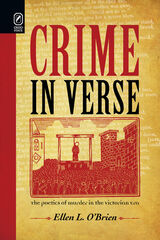
Crime in Verse
The Poetics of Murder in the Victorian Era
O’Brien, Ellen L.
The Ohio State University Press, 2008
Over the last few decades, Victorian scholars have produced many nuanced studies connecting the politics of crime to the generic developments of the novel—and vice versa. Ellen L. O’Brien’s Crime in Verse grants the same attention and status to poetic representations of crime. Considering the literary achievements and cultural engagements of poetry while historicizing murder’s entanglement in legal fictions, punitive practices, medical theories, class conflicts, and gender codes, O’Brien argues that shifting approaches to poetry and conflicted understandings of murder allowed poets to align problems of legal and literary interpretation in provocative, disruptive, and innovative ways.
Developing focused analyses of generic and discursive meanings, individual chapters examine the classed politics of crime and punishment in the broadside ballad, the epistemological tensions of homicidal lunacy and criminal responsibility in the dramatic monologue, and the legal and ideological frictions of domestic violence in the verse novel and verse drama. Their juxtaposition of the rhymes of anonymous street balladeers, the underexamined verse of “minor” poets, and the familiar poems of canonical figures suggests the interactive and intertextual relationships informing poetic agendas and political arguments. As it simultaneously reconsiders the institutional and ideological status of murder and the aesthetic and political interests of poetry, Crime in Verse offers new ways of thinking about Victorian poetry’s contents and contexts.
[more]
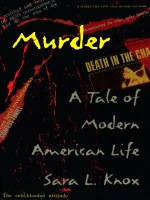
Murder
A Tale of Modern American Life
Sara L. Knox
Duke University Press, 1998
What exactly is it about murder that claims such a powerful hold on the American imagination? In this book, Sara L. Knox examines postwar America’s preoccupation with this act of violence. Demonstrating how American culture both consumes and produces tales of murder, Knox examines numerous relevant narratives—news stories, psychiatric testimony, legal transcripts, fictional accounts, and examples from the thriving literary genre of true crime.
In her approach to the telling of this cultural phenomenon, Knox draws on historical analysis and original research. She discusses such subjects as the continuing existence of capital punishment, the “sensational” American murderers Martha Beck and Ray Fernandez (aka the Honeymoon Killers), the connection between true crime books and romance narratives, and pulp murder novels of the 1930s and 1940s. Analyzing widespread interest in forensic psychiatry, sexuality, mortality, and the relation of gender to society’s reactions to murder, Knox refers to the early work of David Brion Davis, Bill Ellis, and Joel Black. While demonstrating how society’s focus has shifted from the act itself to the psychology of the murderer to the broader social forces at work, she discusses the writings of Willard Motley, William March, Curtis Bok, James Baldwin, and Kate Millett, among others.
Full of anecdotes and insights, Murder is a lively meditation on American culture that includes not only close critical readings of individual texts but also everyday matters of murder’s meaning. It will interest those involved with American studies, cultural studies, and true crime accounts.
In her approach to the telling of this cultural phenomenon, Knox draws on historical analysis and original research. She discusses such subjects as the continuing existence of capital punishment, the “sensational” American murderers Martha Beck and Ray Fernandez (aka the Honeymoon Killers), the connection between true crime books and romance narratives, and pulp murder novels of the 1930s and 1940s. Analyzing widespread interest in forensic psychiatry, sexuality, mortality, and the relation of gender to society’s reactions to murder, Knox refers to the early work of David Brion Davis, Bill Ellis, and Joel Black. While demonstrating how society’s focus has shifted from the act itself to the psychology of the murderer to the broader social forces at work, she discusses the writings of Willard Motley, William March, Curtis Bok, James Baldwin, and Kate Millett, among others.
Full of anecdotes and insights, Murder is a lively meditation on American culture that includes not only close critical readings of individual texts but also everyday matters of murder’s meaning. It will interest those involved with American studies, cultural studies, and true crime accounts.
[more]
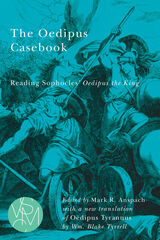
The Oedipus Casebook
Reading Sophocles' Oedipus the King
Mark R. Anspach
Michigan State University Press, 2019
Who killed Laius? Most readers assume Oedipus did. At the play’s end, he stands convicted of murdering his father, marrying his mother, and triggering a deadly plague. With selections from a stellar assortment of critics including Walter Burkert, Terry Eagleton, Michel Foucault, René Girard, and Jean-Pierre Vernant, this book reopens the Oedipus case and lets readers judge for themselves. The Greek word for tragedy means “goat song.” Is Oedipus the goat? Helene Peet Foley calls him “the kind of leader a democracy would both love and desire to ostracize.” The Oedipus Casebook readings weigh the evidence against Oedipus, place the play in the context of Greek scapegoat rites, and explore the origins of tragedy in the festival of Dionysus. This unique critical edition includes a new translation of the play by distinguished classics scholar Wm. Blake Tyrrell and the authoritative Greek text established by H. Lloyd-Jones and N. G. Wilson.
[more]
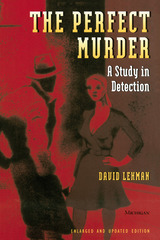
The Perfect Murder
A Study in Detection
David Lehman
University of Michigan Press, 2000
In this lively, enjoyable look at the best American and British detective fiction, David Lehman investigates the mystery of mysteries: the profound satisfactions we get from evil, disorder, mayhem, and deception--that we know will be put right by the last page.
As Lehman shows, the detective story draws deeply from ancient storytelling traditions. The mystery's conventions--the locked room, the clue "hidden" in plain sight, the diabolical double, the villainous least likely subject--work on us as childhood fairy tales do; they prey upon our darkest fears, taking us to the brink of the unbearable before restoring a comforting sense of order. The myth of Oedipus, for example, contains the essential elements of a whodunit, with the twist that the murderer the detective pursues is himself.
With their wisecracking gumshoe heroes, Dashiell Hammett and Raymond Chandler fashioned an existential romance out of the detective novel. More recent writers such as Ross MacDonald, P. D. James, and Ruth Rendell have raised the genre to a new level of psychological sophistication. Yet the form evolves still, and Lehman guides us to the epistemological riddles of Jorge Luis Borges and Umberto Eco, who challenge the notion of a knowable truth. Originally published in 1989, this new edition features an additional chapter on the mystery novels of the 1990s.
"A lively study of the development and varieties of the detective story since Poe, its relations with other forms high and low, and the latter-day appropriation of its techniques by such writers as Borges and Eco. . . . A thoroughly intelligent and readable book." --Richard Wilbur, Pulitzer-Prize winning poet
David Lehman is the series editor of both the The Best American Poetry, published by Scribner, and the Poets on Poetry series published by the University of Michigan Press. He is a former Guggenheim Fellow in poetry, a vice president of the National Book Critics Circle, and the author of several books of criticism and collections of poems.
As Lehman shows, the detective story draws deeply from ancient storytelling traditions. The mystery's conventions--the locked room, the clue "hidden" in plain sight, the diabolical double, the villainous least likely subject--work on us as childhood fairy tales do; they prey upon our darkest fears, taking us to the brink of the unbearable before restoring a comforting sense of order. The myth of Oedipus, for example, contains the essential elements of a whodunit, with the twist that the murderer the detective pursues is himself.
With their wisecracking gumshoe heroes, Dashiell Hammett and Raymond Chandler fashioned an existential romance out of the detective novel. More recent writers such as Ross MacDonald, P. D. James, and Ruth Rendell have raised the genre to a new level of psychological sophistication. Yet the form evolves still, and Lehman guides us to the epistemological riddles of Jorge Luis Borges and Umberto Eco, who challenge the notion of a knowable truth. Originally published in 1989, this new edition features an additional chapter on the mystery novels of the 1990s.
"A lively study of the development and varieties of the detective story since Poe, its relations with other forms high and low, and the latter-day appropriation of its techniques by such writers as Borges and Eco. . . . A thoroughly intelligent and readable book." --Richard Wilbur, Pulitzer-Prize winning poet
David Lehman is the series editor of both the The Best American Poetry, published by Scribner, and the Poets on Poetry series published by the University of Michigan Press. He is a former Guggenheim Fellow in poetry, a vice president of the National Book Critics Circle, and the author of several books of criticism and collections of poems.
[more]
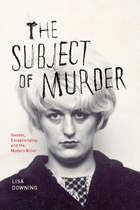
The Subject of Murder
Gender, Exceptionality, and the Modern Killer
Lisa Downing
University of Chicago Press, 2013
The subject of murder has always held a particular fascination for us. But, since at least the nineteenth century, we have seen the murderer as different from the ordinary citizen—a special individual, like an artist or a genius, who exists apart from the moral majority, a sovereign self who obeys only the destructive urge, sometimes even commanding cult followings. In contemporary culture, we continue to believe that there is something different and exceptional about killers, but is the murderer such a distinctive type? Are they degenerate beasts or supermen as they have been depicted on the page and the screen? Or are murderers something else entirely?
In The Subject of Murder, Lisa Downing explores the ways in which the figure of the murderer has been made to signify a specific kind of social subject in Western modernity. Drawing on the work of Foucault in her studies of the lives and crimes of killers in Europe and the United States, Downing interrogates the meanings of media and texts produced about and by murderers. Upending the usual treatment of murderers as isolated figures or exceptional individuals, Downing argues that they are ordinary people, reflections of our society at the intersections of gender, agency, desire, and violence.
[more]
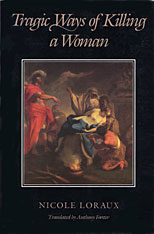
Tragic Ways of Killing a Woman
Nicole Loraux
Harvard University Press, 1987
In ordinary life an Athenian woman was allowed no accomplishments beyond leading a quiet and exemplary existence as wife and mother. Her glory was to have no glory. In Greek tragedy, however, women die violently and, through violence, master their own fate. It is a genre that delights in blurring the formal frontier between masculine and feminine. Through the subtlety of her reading of these powerful and ambiguous texts, Nicole Loraux elicits an array of insights into Greek attitudes toward death, sexuality, and gender.
[more]
READERS
Browse our collection.
PUBLISHERS
See BiblioVault's publisher services.
STUDENT SERVICES
Files for college accessibility offices.
UChicago Accessibility Resources
home | accessibility | search | about | contact us
BiblioVault ® 2001 - 2024
The University of Chicago Press









